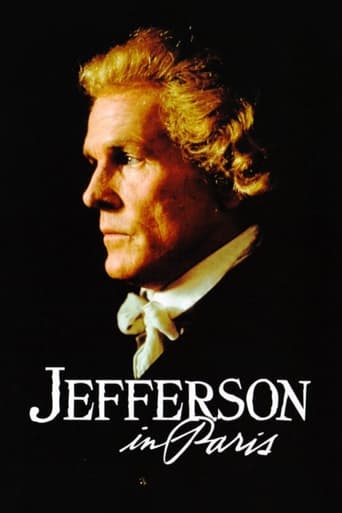oneillrobyn
Jefferson promised to his wife on her deathbed that he would never marry again. It turns out that Sally Hemings and Jefferson's wife were half-sisters ... they had the same father. It has been noted that Jefferson's older daughter knew of the relationship but of course it wasn't discussed in their presumably polite household. I just got a tape (that's the only format available today) and I haven't looked at it yet. Since I saw the film only when it was released, and I've learned a lot about Jefferson since then, I'm looking forward to finding free time to just sit and watch. I'll be back and possibly change my rating, but I remember wishing for a more dynamic actor to play Jefferson.
RodReels-2
The lavish production values that you generally find in a Merchant/Ivory film are all here, but this is an exceedingly dull take on what could have been a very lively affair. I agree with an earlier poster that it makes no sense for the story to be unfolding through the eyes of an African American family and yet their own ancestor, Sally Hemmings, has barely a role to play in the proceedings. There is not much clarity to be found in helping the audience understand the motivations of any of these historical figures. And I was very bothered by the accents of a number of the characters. Nancy Marchand sounded very British for what one assumes is a French nun. And both Gwyneth Paltrow and Greta Scacchi seemed to be trying out different accents in various scenes. In fact, Gwyneth is very poorly served in this biopic. Her role as Thomas Jefferson's daughter, Martha, is written in such a manner that we never get a handle on who she really is. One moment she is slapping a slave, and another moment, she's deploring the whole system of slavery. Nick Nolte performs the role well enough but doesn't ever make us truly care for Jefferson or any of his exploits. Very disappointing all in all.
sol-
A well researched period piece from the Merchant-Ivory team, the depicted setting and era come alive with the apt costumes and sets. The film however tells little in the way of a story, and the methods of narration are awfully clumsy. The whole Jefferson story is supposedly narrated by one person, however that story in itself is narrated by the Jefferson character and others through different letters. It is a bit confusing, and does not gel well together. Even if it is hard to explain, it should be easy to pick up on this awkwardness when watching the film. Some of the sequences also feel like they are just for show, for they add very little to the story. However, even if this is a flawed film, it has enough good qualities to rate above average. The film is set to wonderful Richard Robbins music and Thandie Newton really makes the most of her role. There is quite a bit that one can enjoy in this film, even if it is hardly perfect viewing.
Geofbob
This is a screen account, directed by James Ivory, of a fascinating historical episode - Thomas Jefferson's period as US ambassador in Paris for the five years leading up to the 1789 revolution. Many Americans may be put off the film, because they do not accept its assumption that Jefferson was the father of children born to his young slave Sally Hemings. Non-Americans may be less interested in this arguable relationship than in the undoubted fact that Jefferson - a passionate believer in individual liberty and draftsman of the Declaration of Independence with its ringing references to equality and inalienable rights - was a slave-owner, and that he could justify his two-way stance (at least to himself).Jefferson also displays double-think when, though a fierce defender of religious liberty, he stops his pious, dutiful daughter Patsy (Martha) -an admirable portrayal by Gyneth Paltrow in a difficult role - from converting to Catholicism and joining a convent. Overall, Jefferson does not come out of the movie too well. In addition to revealing him as a child-molesting hypocrite, Ruth Jhabvala's scenario allows Nick Nolte to convey the tentative and observant side of Jefferson's character, but gives him scant opportunity to bring out the depth and breadth of Jefferson's mind or his political philosophy.In addition to the visual delights of costume and setting that we have learned to expect from Merchant-Ivory productions, the most successful aspect of the movie is the all-but love affair between Jefferson and witty, charming Maria Cosway - the wife of a foppish English artist (Simon Callow in full make-up) - a role in which Greta Scacchi lights up the screen. By contrast, Thandie Newton has been criticised for her awkward hamming as Sally, but it should be remembered that she is playing an uneducated 14 or 15 year old girl.Perhaps the movie's worst features are the "framing" sequences set in the late 19th century, where a Jefferson/Hemings descendent (James Earl Jones) relates his family history to a newspaper reporter. If these superfluous scenes had been cut, perhaps there would have been time to go deeper into Jefferson's politics, which after all is why the man is remembered today.





